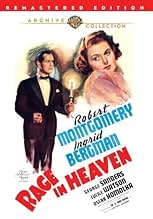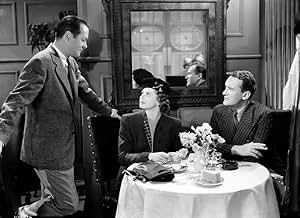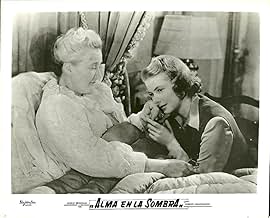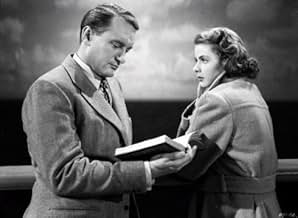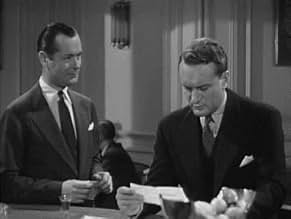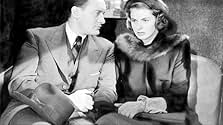IMDb RATING
6.4/10
1.4K
YOUR RATING
Robert Montgomery and George Sanders team up to play against type in this probing psychological thriller that features Ingrid Bergman as the object of their obsessions.Robert Montgomery and George Sanders team up to play against type in this probing psychological thriller that features Ingrid Bergman as the object of their obsessions.Robert Montgomery and George Sanders team up to play against type in this probing psychological thriller that features Ingrid Bergman as the object of their obsessions.
- Awards
- 3 wins total
Frederick Worlock
- Solicitor-General
- (as Frederic Worlock)
Ludwig Hardt
- Durand
- (as Ludwig Hart)
Stuart Hall
- Traveling Salesman
- (scenes deleted)
Major McBride
- Bank Clerk
- (scenes deleted)
Clive Morgan
- Traveling Salesman
- (scenes deleted)
Joseph North
- Undertaker
- (scenes deleted)
Wyndham Standing
- Dr. McTernan
- (scenes deleted)
Harry Allen
- Jury Foreman
- (uncredited)
6.41.4K
1
2
3
4
5
6
7
8
9
10
Featured reviews
A good, solid, psychological thriller
I might be in the minority here, but I really liked this movie. George Sanders, playing against type, was quite believable as Ward Andrews, a decent guy in love with his best friend's wife, but too noble to pursue her. Ingrid Bergman, as Stella, plays the conflicted wife very well. She loves her husband, but as he becomes more paranoid and jealous, you see her suffering from the emotional abuse he heaps on her. But the real surprise of this movie is Robert Montgomery. According to Ingrid Bergman, he told her he planned on phoning in his performance because he was angry with MGM for putting him in this film. If he did, it was a brilliant decision. His underplaying and detachment gave him the air of someone who was convinced of the rationality of his increasingly irrational behavior. I never thought I'd say this about Robert Montgomery, but he gave me the kind of creeps in this movie that I got from Anthony Perkins in Psycho.
Harbinger of noir cycle more convincing psychologically than dramatically
A somber-hued melodrama whose psychology is more compelling than its dramaturgy, Rage in Heaven sounds many of the minor-key motifs and dark timbres that would shortly coalesce into the noir cycle. Its most striking aspect has to be its acceptance of its disturbed central character as a given, without attempting to supply a neat, reassuring `explanation.'
The story set in England, for no good reason opens with a teasing prelude at a French insane asylum. But soon, in London, we meet up with Robert Montgomery as he meets up with old chum George Sanders and whisks him off to the country house of Montgomery's widowed mother (Lucile Watson), who in ailing health has retained the services of a companion (Ingrid Bergman). Though Bergman and Sanders generate some electricity, when he departs she marries Montgomery. This proves ill-advised.
Montgomery, who reluctantly has taken charge of the family's steel works, shows himself to be not only incompetent, irrationally jealous and vindictive, but also self-loathing, desperately insecure, and (as it turns out, like his father) suicidal. He requires unquestioned obedience, even at the risk of running his business into the ground or poisoning his marriage. He lures back Sanders in order to validate his suspicions of an affair between his wife and his best friend but, when no evidence emerges, devises a fiendish plot to ruin all their lives. His plans almost succeed, but for an eleventh-hour deus ex machina, in the person of the head of that sanitarium in the outskirts of Paris.
Though somewhat cleverly contrived, the ending remains a contrivance yet doesn't quite invalidate the movie's dark vision (perhaps owing more to Christopher Isherwood, who wrote the screenplay, than to James Hilton's novel). Montgomery elects to play a charming villain, as he did in Night Must Fall, perhaps unsure of just how to depict a deranged psyche (he wasn't far off the mark). Sanders gets wasted as a square-rigger, which was never his long suit.
That leaves the radiant Bergman, two years before Casablanca assured her stardom, handed the thankless world of the loyal, longanimous wifey. In this flawed but unsettling and precocious melodrama, it's she who utters the final benediction. That benediction lingers in the mind as an enlightened touch and a far cry from the black/white mentality of today's thrillers, which view psychological aberration as just a more heinous kind of evil, and so a further justification for triumphantly exterminating the evildoers.
The story set in England, for no good reason opens with a teasing prelude at a French insane asylum. But soon, in London, we meet up with Robert Montgomery as he meets up with old chum George Sanders and whisks him off to the country house of Montgomery's widowed mother (Lucile Watson), who in ailing health has retained the services of a companion (Ingrid Bergman). Though Bergman and Sanders generate some electricity, when he departs she marries Montgomery. This proves ill-advised.
Montgomery, who reluctantly has taken charge of the family's steel works, shows himself to be not only incompetent, irrationally jealous and vindictive, but also self-loathing, desperately insecure, and (as it turns out, like his father) suicidal. He requires unquestioned obedience, even at the risk of running his business into the ground or poisoning his marriage. He lures back Sanders in order to validate his suspicions of an affair between his wife and his best friend but, when no evidence emerges, devises a fiendish plot to ruin all their lives. His plans almost succeed, but for an eleventh-hour deus ex machina, in the person of the head of that sanitarium in the outskirts of Paris.
Though somewhat cleverly contrived, the ending remains a contrivance yet doesn't quite invalidate the movie's dark vision (perhaps owing more to Christopher Isherwood, who wrote the screenplay, than to James Hilton's novel). Montgomery elects to play a charming villain, as he did in Night Must Fall, perhaps unsure of just how to depict a deranged psyche (he wasn't far off the mark). Sanders gets wasted as a square-rigger, which was never his long suit.
That leaves the radiant Bergman, two years before Casablanca assured her stardom, handed the thankless world of the loyal, longanimous wifey. In this flawed but unsettling and precocious melodrama, it's she who utters the final benediction. That benediction lingers in the mind as an enlightened touch and a far cry from the black/white mentality of today's thrillers, which view psychological aberration as just a more heinous kind of evil, and so a further justification for triumphantly exterminating the evildoers.
Good old fashioned entertainment
Lighten up reviewer and enjoy this movie for what it is. Good Old fashioned entertainment. I've watched this movie man times and always enjoy it. Aubrey Mather as Clark is worth the admission price.
Gee, I kind of liked it
I guess I'll be the resident moron of this film's comment section. I liked Rage in Heaven. It was entertaining, interesting, and involving.
I realize Robert Montgomery phoned in his role. His complete detachment makes the character evil rather than sick, and one cannot feel sympathy for him, if we were ever supposed to. The biggest problem is that his flat line readings and cool demeanor make it unbelievable that Bergman married a man so completely lacking in self-esteem, charm, and ardor.
The very young, pre-superstar Ingrid Bergman is marvelous - very fresh and vibrant in the beginning, her personality becoming more somber after a short time being married to Montgomery. And who can blame her. George Sanders is excellent, his portrayal possessing all the charm and passion Montgomery lacks.
As far as this plot being contrived, perhaps, but it was also clever. The original ending of "Fatal Attraction" was based on the same idea. Seen in today's modern perspective "Rage in Heaven" is most interesting. The obsession that Phillip had for Wade - very bizarre indeed!
I realize Robert Montgomery phoned in his role. His complete detachment makes the character evil rather than sick, and one cannot feel sympathy for him, if we were ever supposed to. The biggest problem is that his flat line readings and cool demeanor make it unbelievable that Bergman married a man so completely lacking in self-esteem, charm, and ardor.
The very young, pre-superstar Ingrid Bergman is marvelous - very fresh and vibrant in the beginning, her personality becoming more somber after a short time being married to Montgomery. And who can blame her. George Sanders is excellent, his portrayal possessing all the charm and passion Montgomery lacks.
As far as this plot being contrived, perhaps, but it was also clever. The original ending of "Fatal Attraction" was based on the same idea. Seen in today's modern perspective "Rage in Heaven" is most interesting. The obsession that Phillip had for Wade - very bizarre indeed!
the overall story, and stars don't click
''Rage in Heaven'' wasn't a bad movie, but it wasn't good either...... I'm not sure, if it's because of the story, or because of the actors performances...... Ingrid Bergman was fine...... You could tell, that she tried to make the best of it, but there was NO chemistry at all, between her and Robert Montgomery, George Sanders...... Montgomery looks tired, and seems to be sleepwalking through the movie...... He downplayed his mentally disturbed character too much...... He seemed more alert, towards the last half of the film...... From what I read, in Ingrid Bergman's autobiography, she said, that Montgomery was forced to do this movie, so he told her, that he won't act..... That probably explains his bored looks in the movie...... Overall, could've been a better movie, if they rearranged the cast or something.......
Did you know
- TriviaW.S. Van Dyke took over the direction of the movie from Robert B. Sinclair, who became ill shortly after shooting began. Van Dyke was in the Marines, but was granted a 14-day leave to finish the picture. Neither Sinclair nor Van Dyke was available for re-takes, which were then directed by Richard Thorpe.
- GoofsThe movie commences with a quote, "Heaven hath no rage like love to hatred turned", which it attributes to Milton. The quote is in fact from William Congreve's play "The Mourning Bride".
- Quotes
Stella Bergen: My life is like this clearing. Nice and peaceful with paths leading in all directions. Only, I don't know which one to take.
- ConnectionsFeatured in Ingrid (1984)
- How long is Rage in Heaven?Powered by Alexa
Details
- Release date
- Country of origin
- Languages
- Also known as
- Gefährliche Liebe
- Filming locations
- Production company
- See more company credits at IMDbPro
- Runtime
- 1h 25m(85 min)
- Color
- Aspect ratio
- 1.37 : 1
Contribute to this page
Suggest an edit or add missing content


